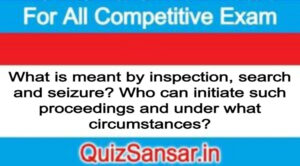
What is meant by inspection, search and seizure? Who can initiate such proceedings and under what circumstances?
What is meant by inspection, search and seizure? Who can initiate such proceedings and under what circumstances?
Ans.
Power of Inspection, Search and Seizures
Meaning of “Inspection” [Section 67(2) of the CGST Act, 2017]
It is a softer provision than search to enable officers to access any place of business of a taxable person and also any place of business of a person engaged in transporting goods or who is an owner or an operator of a warehouse or godown. Proper officer, not below the rank of Joint Commissioner, is the appropriate authority to make inspection. Where the proper officer has reasons to believe that:
A taxable person has suppressed any transaction relating to supply of goods or services or both or the stock of goods in hand; or he has claimed input tax credit in excess of his entitlement or a person engaged in the business of transporting goods or an owner or operator of a warehouse/godown or any other place is keeping goods which have escaped payment of tax or has kept his accounts or goods in such a manner as is likely to cause evasion of tax payable.
Then the Proper Officer can:
Inspection: Any place of business of the assessee who has evaded the tax or of the transporter who transported such tax evading goods or godown/warehouse.
Operator in which such tax evading goods or accounts relating thereto has been stored.
Search & Seizure: The goods or any documents or books or things which are liable for confiscation and which will be instrumental in the proceedings under this act during the enquiry period.
Electronic device
Seal or Break : Open the door of any premises, storage, box or receptacle where goods, books of accounts etc. are concealed and when access to the same is denied to the said officer.
Power for asking of information is not arbitrary and uncanalised. Before issuing a notice, the officer must apply his mind to the facts of the case and give due regards to the necessity of not disturbing the business of the dealer. The inspector do not have the powers to call for the information and accounts for the year for which assessment has already been completed.
The proper officer may authorise, in writing, any other officer of Central/State tax to inspect-any places of business of the taxable person, or any places of business of the persons engaged in the business of transporting goods, or any places of the operator of warehouse or godown, or any other place.
Meaning of “Search”
The term ‘Search’, in simple language, denotes an action of a government machinery to go, look through or examine carefully a place, area, person, object etc, in order to find something concealed or for the purpose of discovering evidence of a crime. The search of a person or vehicle or premises etc. can only be done under proper an valid authority of law.
Meaning of “Seizure”
“Seizure”, is defined as the act of taking possession of property by an officer under legal process. It generally implies taking possession forcibly, contrary to the wishes of the owner of the property or who has the possession and who was unwilling to part with the possession.
Any officer authorised by the proper officer, not below the rank of Joint Commissioner is the appropriate authority under the law. Where the authorised officer, either pursuant to an inspection carried out or otherwise, has reasons to believe that-any goods liable to confiscation, or any documents or books or things, which in his opinion shall be useful for relevant to any proceedings are secreted in any place, he may authorise in writing any other officer of central tax to search and seize or may himself search and seize such goods, documents or books or things.
Where the proper officer has ‘reasons to believe that any person has evaded or is attempting to evade the payment of any tax, he may in connection with any proceedings, for reasons to be recorded in writing, seize the accounts, registers or documents of such person produced before him and shall grant a receipt for the same and shall retain the same for so long as may be necessary.






